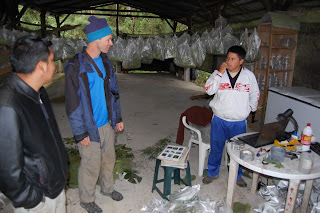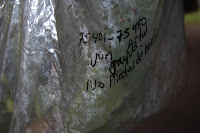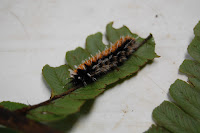After breakfast, I elected to join fellow Eartwatcher Keith Christiansen at the caterpillar zoo, known as the maquina since it works like a machine as caterpillars enter one end of the barn structure and emerge from the other side as adults (moths, skippers, or butterflies). Our task would be to photograph collected caterpillar specimens with two digital SLR cameras outfitted with macro lenses and soft flashes. The images would be used for the project's digital catalogue and database.
 |
| Dr. Lee Dyer and gusaneros Lucho and Wilmer |
 |
| Keith getting ready to shoot |
 |
| La maquina |
At first, it was slow work as we first shot the number written on the specimen's plastic bag and then removed the leaves and searched for the caterpillar(s). Each bag contained host plant leaves and one to eight (or more) caterpillars (plus random beetles and spiders). We were tasked to photograph each caterpillar from each side and from above (top view). This was easy for some of the larger and/or slower caterpillars, aka orugas. It was rather challenging to photograph the specimens which were exceedingly small or fast-moving. Still, I enjoyed this assignment very much and even continued with it after our lunch break. Having a background in photography and an interest in cataloguing made this task enjoyable. Plus, after shooting what must have been more than 40 specimens, most of them different species, I was really able to view such a wealth of caterpillar variety. We only scratched the surface, but what a remarkable surface it was! In addition, as my partner and I worked, we were visited by long-winged butterflies, dragonflies, and a stick bug who appeared to be rather curious about us and our photographic work.
As the afternoon lengthened, lead scientist Lee Dyer called Keith and I from our task in la maquina so that we could contribute to a larger task. Many of the team had assembled to inventory caterpillars found on the leaves of a few piper plants that Dr. Dyer and Dr. Walla had retrieved from local roadsides. These pipers have been growing in distressed areas of the forest and the density of Eois caterpillars on these plants may give an indication as to the health of the rain forest in this region. We meticulously examined each leaf of two piper plants, looking for tiny to "large" Eois instars, caterpillars at various stages of development. Our team searched more than 1200 leaves and found many caterpillars nestled along the veins on the leaves' undersides. As of this evening, our task was incomplete but the researchers seemed pleased with our progress.
Our evening ended with a dinner celebration of Dr. Dyer's birthday and his lecture on immature insects -- the various families of caterpillars studied and identified by Dyer and his research teams. It is remarkable how much they have learned about the role of climate change on biodiversity, specifically caterpillars, plants, and parasitoids. And yet, Dyer mentioned that most of the new species of caterpillars and/or adult moths that they have collected and identified as unique will never be named due to a lack of interest, funding, and taxonomists. As more and more ecosystems are destroyed, Dyer suggests that it is just like libraries burning down without any of the books ever being read. This news is both sobering and sad...
QUESTION: If our tropical rain forests are like libraries full of unread books (unnamed and unknown species), how can we protect them before all of the "books" are destroyed?
 |
| Surprise! Happy birthday, Dr. Dyer! |
















Zack Brown
ReplyDeleteIf tropical rain forests where like books in libraries that where unknown we would first have to find out what the unknown species where like and how we could protect them. Because if you don't know what a species is like than how can you protect them.
We would have to understand the species and know how to save them and what they would need to survive, if we didn't know about them, we couldn't protect them. After we learned about them we could take action and save them.
ReplyDeleteIf a tropical rain forest were like books in a library that were unread and unknown we would have to conduct research on the species to find out more about that species. Then once you know a lot about those species', you can protect them and their habitat.
ReplyDeleteThe tropical rain forests may be similar to unread books in a library. We must prevent climate change and man from destroying the rain forests so we can identify all the species of plants and animals. Laws should be made to prevent this destruction. Also, funds for this protection should be set up.
ReplyDeleteBefore all the ''books'' are destroyed we should catalog them and keep them safe.
ReplyDeletewe read. then discover. then categorize. then protect them by law. nature is a very important thing we shouldnt waste it. its valuable to humans.
ReplyDeleteAmen to that.
DeleteIf a tropical rainforest were like books in libraries unread and untouched you can go around and list everything before it gets destroyed by humankind.
ReplyDeleteIf our tropical rain forests are like libraries full of unread books then we would have to study and document all the animals and their habitats in order to protect them. Humans are destroying all the forests and killing all of the wildlife which is preventing us from looking and studying each and every species.
ReplyDeleteIf tropical rain forests were like libraries full of unread books we can protect them by making sure the rain forest doesn't get chopped down and making sure that the natural habitat for unknown species are not disturbed.
ReplyDeleteADAM H.
ReplyDeleteIf the rain forrest is like a library and unknown speeches as books we could put them in a safe place with out any predators around to hurt them.
BROOKE B.
ReplyDeleteIf tropical rain forests were like unread books we could protect the species by conducting research on them. If we tried to find new species we could protect them by studying them and seeing what kind of habitat that they live in. While studying them we could observe their nature, what they eat, and what their habits are and then we could try to save them.
JOHN C.
ReplyDeleteHow we protect tghose books is keeping the enviroment clean, not letting deforestation happen, and keep poachers or animal killers away.
ZOE W.
ReplyDeleteIf our tropical rain forests were like libraries full of unread books that are unnamed and a unknown species, we could protect them before all of the " books" are destroyed in many ways. One way that people can help is by doing some research and finding out how to help these species and then spreading the word so people no not to hurt these species or "destroy the book".
LIZA B.
ReplyDeleteWe could stop cutting as much trees.We also should be careful of the amount of paper we use.
ALEX W.
ReplyDeleteIf a tropical rain forest were like unread books in a library, we would have to make sure it (the rain forest) wouldn't get destroyed. Also, we would have to protect the species that live there.
WESTON J.
ReplyDeleteIf tropical rainforests are like libraries full of unread books, we should do more research about the species and find names for them. If people knew about different species of insects they might be more interested in finding out about them or even going somewhere and volunteer to help the insect. We should be trying to find out more about these unnamed and unknown species.
NICHOLAS Y.
ReplyDeleteIf a rain forest was like a library with unread books there are two ways to save it. First you could try to save the ecosystem by not allowing people to destroy it. Then you can research the unknown species in order to find out how to save them. These are the two ways that you are able to save the unnamed and unknown speies.
If the tropical rainforest is like a library and has unread "books", we can protect those books by making sure the library doesn't get destroyed. Also that no one goes in the library and making a mess. The library will be preserved as long as it doesn't receive any damage, or harm to the books that have been read and unread.
ReplyDeleteIf our tropical rain forests were like libraries full of unread books that are unnamed and a unknown species, we could protect them before all of the " books" are destroyed in numerous ways. We could first research all or many of the trees and unknown species in the rain forests. Then, we could broadcast the idea of saving the wildlife and not cutting down trees. With a lot of help, the problem of rain forests getting cut down could come to an end.
ReplyDeleteIf our tropical rain forests were like libraries full of unread books we could help protect them by researching about them so that we can also protect the species that live there so they don't get destroyed.
ReplyDeleteIf our tropical rain forests were like libraries full of unread books we could protect them by recording and studying the unknown species we can also protect them by preventing deforestation and animal killing.
ReplyDeleteIn order to the save the wildlife, we would first have to know about all of the "books" and how we could protect them. If there are still species we weren't aware of, it would be harder to preserve them and their habitats. Even if we don't know about a few types, people can help protect all of them by not cutting down and destroying the rainforest which is their home, and instead preserve them.
ReplyDeleteIf our rain forests were like libraries full of unread books, we could catalog all species and then create laws which prevent people from causing harm to them.
ReplyDeleteTo protect the "books" we could probably set up laws that could prevent people from destroying all the "books". The only problem with this is we would have to enforce these laws which would be difficult because there are a lot of huge forests and we cant monitor all of them 24/7 to enforce the laws.
ReplyDeleteTo protect the unread 'books' we should prevent deforestation because when their habitat is gone, we can never discover them and learn new things about the species in our world. We should also prevent erosion in the rain forests where there isn't a path, so that we can keep the species.
ReplyDeleteIf our tropical rain forests were like libraries full of unread books, we can do many things to protect them. We could do more research to learn more about what the species need to survive and not let climate change harm them. Then enforce laws protecting them from being harmed by people. If we don't know anything about the types of "books" in the library, it is very hard to keep them safe.
ReplyDeleteIf our tropical rain forests were like libraries full of unknown species "books," we can make laws that would make hunting in rain forests illegal so we can protect all animals even if we don't know about them. We can also find out things like where the animals' natural habitat is, what it eats, etc. so we can protect them from then on. We need to know facts about the animal so we can put them in a place where they will be protected and not harmed.
ReplyDeleteTo try save wildlife, we should first understand all of the “books" and how people can help them. If there were a type of animal that people did not know much about it would be harder to protect them and where they live. Everyone can help them by typing to prevent deforestation and try to protect a species and their habitat.
ReplyDeleteSince we would not know about these unread "books" it would be hard to save them without knowing what they need to survive and what kills them. We can prevent harming them by not doing things that we know are wrong like deforestation and using any chemicals on our own home garden.
ReplyDelete-Fab Mastah
If the rain forest was a library with unknown "books" we would have to find out more about the books and what they are like in order to save them, otherwise we might lose the chance to "read" them at all. This shows why exploration in this area is so important.
ReplyDeleteIf our tropical rain forests are like libraries full of unknown "books" we can protect them in many ways. We can research everything and then we can pass out the word saying that no one is allowed to destroy the wildlife in these rain forests. If we end up doing something like this, deforestation would eventually come to a stop.
ReplyDeleteCOLE T.
ReplyDeleteFirst we would have to learn about the rain forests in order to save them from being destroyed.
MIKAELA K.
ReplyDeleteIf our tropical rain forests were like libraries full of unread books, we should definitely protect those unread "books" (unknown species). First we should list the names of the unknown species and if possible, take pictures of them. In other words, we need to document and study them, that way we already have a head start on our research. By researching the unknown species we can figure out how to protect them so they have a nice, safe habitat before they are destroyed.
ANNA E.
ReplyDeleteFor us to protect all the unread "books" we have to do lots of research and study those books, for us to gather the information before it becomes lost
JULIET S.
ReplyDeleteHow you can protect those "books" is by protecting our rain forest; not polluting, not destroying the "library", and understanding what the species is. You would need to actually know what the species needed to know how you could protect it. Maybe you could even protest against the polluters to keep them from destroying the rain forest.
SEBASTIAN M.
ReplyDeleteI the tropical rainforest is like a library they are books that may be damaged. Its our job to organized and protect the books. There are many unread books in the library because we have a lot to learn.
NICK M.
ReplyDeleteIf are rain forests where like unread or unknown books and all of them where going to be destroyed you would have to protect the books. But first find out what kind of species it is and what it needs to live so then you could give it what it needs to survive.
SHAWN W.
ReplyDeleteWe can protect the books by making a law to stop the people who are destroying books, and they should be punished. and We must stop the people who are doing this, if we do not it will be hard to learn new species or new types of plants or animals, also saving books can save us. It can save us because it can tell you if a certain animal or plant are poisonous.
SARA D.
ReplyDeleteThe only way to protect an unknown species is to learn more about the animal, the way it lives, and if it is a predator or prey. The reason the unknown species is in danger might be because of its surroundings and climate so you would also have to find out why the species lives in the rain forest and not other places like the desert or the woods.
SARAH H.
ReplyDeleteIf there are unknown species in a tropical rainforest, the best way to protect them is to learn about them.
To protect the animal "books" we could get the government to make part of the rainforest and animal reservation, and for the plant "books" we could get the government to pass a law stating that you may not harm the plant "books".
ReplyDeleteStudents,
ReplyDeleteThank you! This blog post closed at 11:59 p.m. on Friday, April 25.
To save the unread "books" we can tell everyone to read them or Try to stop people cutting down the rainforests so that we have time to read them.
ReplyDeleteKiera, these are timed responses. This blog post closed already by the time you posted. Thank you.
Delete